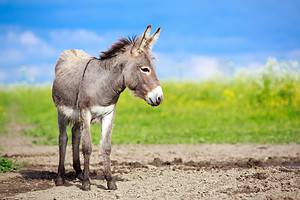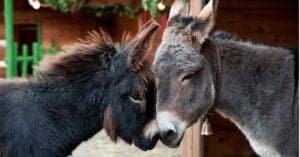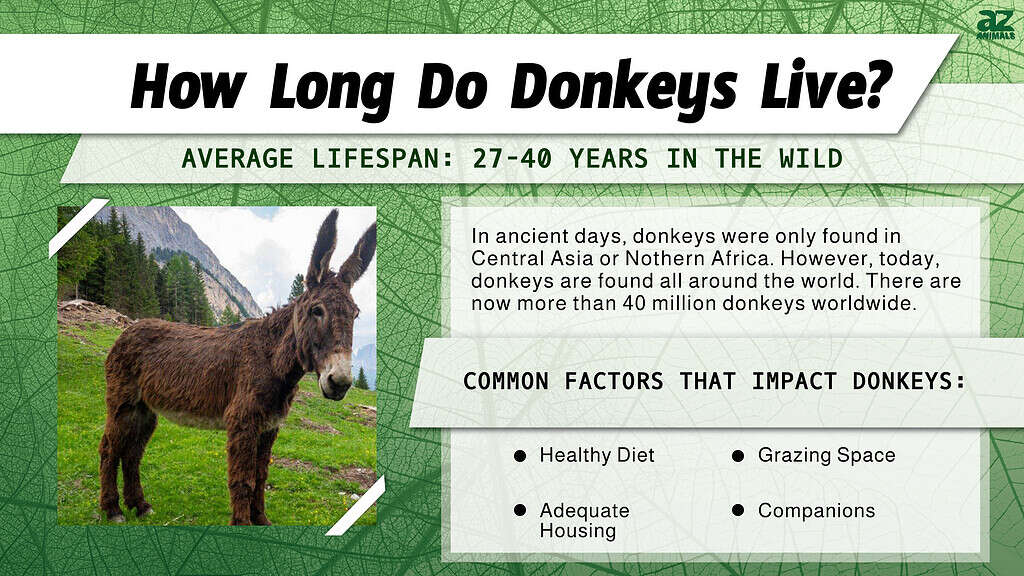
Donkeys have been around since prehistoric times, making them one of the oldest animals that we’ve been breeding. They belong to the same horse family as zebras, and their fossils date back millions of years. As such strong animals, they have been the favored means of transportation in many places across the world and in various situations.
But, have you ever wanted to learn more about these incredibly fascinating and loyal creatures? We’ve got the rundown on donkeys, including information on the average donkey lifespan. So let’s explore this well-known animal and finally answer the question of how long donkeys live!
Quick Crash Course On Donkeys
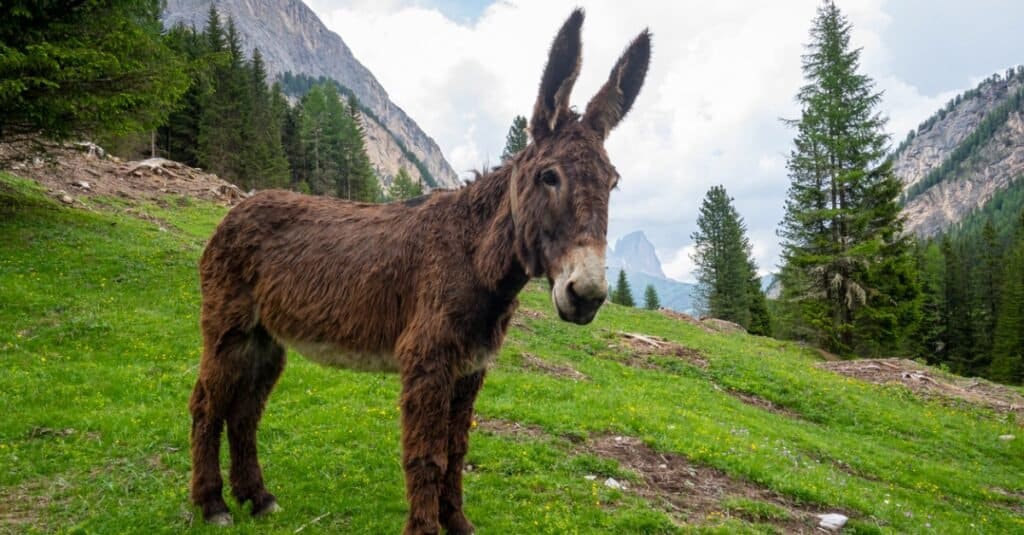
Donkeys are incredibly intelligent.
©iStock.com/Jacek Jacobi
The donkey is a domestic ass that is related to horses and evolved from the African wild ass.
Donkeys have been around for ages. The Egyptians have donkeys to thank for their wealth as they used donkeys to deliver precious metals from Africa. Donkeys were also used to transport silk from the Pacific Ocean to the Mediterranean via the ‘Silk Road’. For many years, donkeys have been used as working animals and many families today still rely on donkeys to transport water and food.
In ancient days, donkeys were only found in Central Asia or Nothern Africa. However, today, donkeys are found all around the world. There are now more than 40 million donkeys worldwide. The countries with the most donkeys are China, Ethiopia, Pakistan, Egypt, and Mexico. Donkeys have proven themselves to be quite loyal, social, intelligent, and extremely useful to humans and this is why they have spread all around the globe.
Now that we better understand the origins of donkeys, let’s explore the average donkey lifespan.
The Average Donkey Lifespan
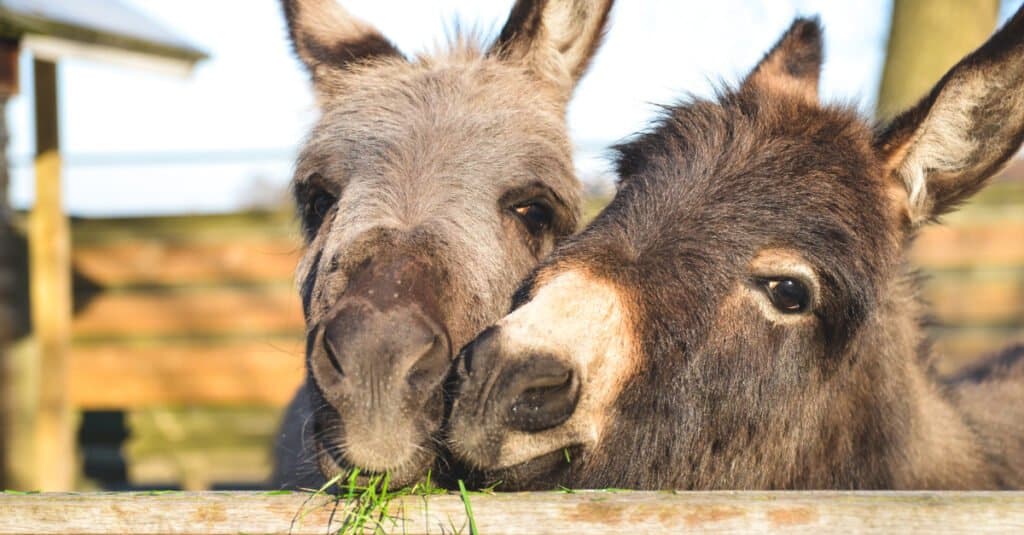
Donkeys have an average lifespan of 27 – 40 years in the wild.
©babeaudufraing/Shutterstock.com
The average donkey lifespan is 27-40 years in the wild. However, in good conditions, they have been known to live up to 50 years. In the wild, their lives are often shortened due to parasite infection or anatomical issues.
A few notable lifespan facts about varying species in different parts of the world:
- According to the Canadian Journal of Applied Sciences, a donkey’s life span in Ethiopia is 9 years, but with proper health care and nourishment, they may live up to 25 years.
- In Mexico, the average lifespan of a donkey is about 15 years.
- Female donkeys, also known as Jennies, are not maintained by donkey owners in various parts of the world because they “create issues and do not function properly.” As a result, the male-to-female ratio in such places is around 4:1, resulting in decreased donkey output.
As you can see, donkeys are able to live quite long lives with the right conditions. However, scarce amounts of food, insufficient or non-existent veterinary care, and severe labor loads all lead to shortening a donkey’s lifespan.
With some more background on the donkey’s lifespan, let’s explore their life cycle and how they grow from baby to adult.
The Average Donkey Life Cycle
The donkey’s life cycle is similar to other mammals. The mothers are pregnant and grow the babies until they are ready to be born into the world. Let’s explore this life cycle in greater detail!
Pregnancy
Male donkeys, also known as jacks, achieve sexual maturity between the ages of 8 months to one year. Jennets can go into heat for the first time between the ages of 8 months and 2 years.
Once pregnant, a donkey’s gestation duration is normally around 12 months, however, it can range from 10 to 14 months. Donkeys have only one foal every birth. Twins are only seen in a few circumstances.
New Born Foals
Unlike other mammals, equine babies are quite developed at birth. This means that the foal will begin standing up within the first hour. They will even begin walking and running on the first day. Although they will be depending on their mother’s milk for nourishment, foals have teeth and will begin eating plants at a few days old.
Weaning Stage
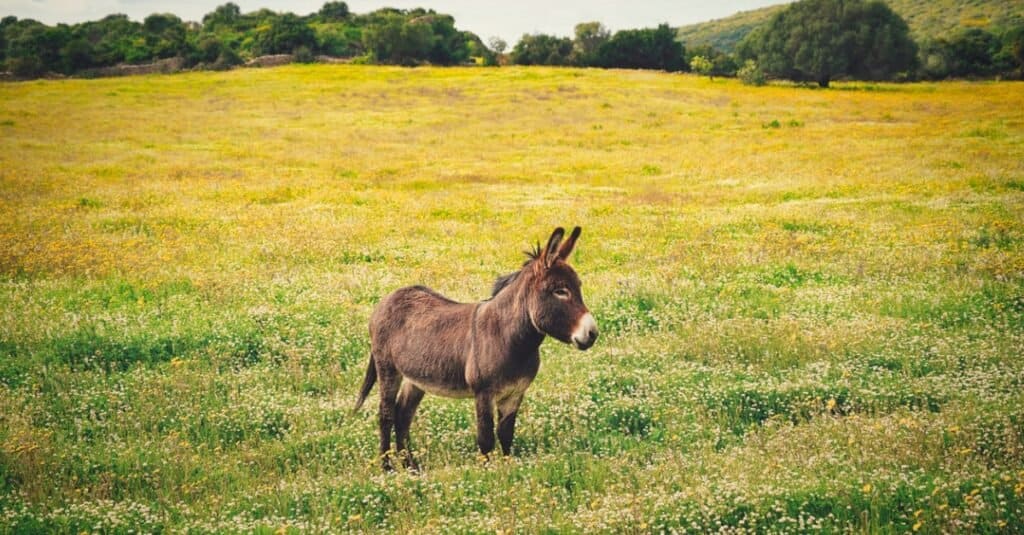
Baby donkeys are called foals.
©iStock.com/lo-chef
After about 4 or 6 months, the mother will begin to wean her foals off her milk. At this point, the donkeys will begin to continue to grow and will rely on plants and other food sources to make up for their mother’s milk. This is the final stage before the donkeys are officially considered adults.
Adulthood
Donkeys will begin to resemble adults at the age of two. But they do not reach full size or maturity until they are between the ages of three and five. When a donkey has reached adulthood, its bones will have finished growing. Finally, when their second set of teeth comes in, the donkey is officially an adult.
How To Extend The Life of Your Pet Donkey
If you happen to have the acreage to house them, donkeys actually make great pets! Donkeys are often friendly and loving. They especially love socializing and they get along with other donkeys and horses. They are, however, highly intelligent and despise being shouted at or made to do anything that they don’t want to. So if you’re interested in having a pet donkey, then pay attention to these tips!
Some things to do to extend your donkey’s lifespan are:
Make Sure They Have Companions
Donkeys are, generally speaking, not meant to live alone. A donkey that has no friends will progressively become more and more unhappy. They’ll begin to express despondent behavior because they grow lonely easily. When they do have a companion, they are extremely loyal. The bonds they have are forever, especially if they are coupled up. Donkeys and horses may form friendships, so if you have horses as well then let them socialize together!
Healthy Diet
Donkeys are classified as herbivores and that means that their diet needs to consist of a lot of plant fiber. To keep them from gaining too much weight, a diet high in fiber and low in sugar is recommended. Donkeys should avoid cereal grain since it is toxic to them.
Grazing Space and Adequate Housing
In order to keep donkeys healthy, they need a clean, dry barn or at least a three-sided shelter. Donkeys enjoy grazing and roaming around while they eat. Pasturage, therefore, is important for them.
The photo featured at the top of this post is © Angyalosi Beata/Shutterstock.com
Thank you for reading! Have some feedback for us? Contact the AZ Animals editorial team.



